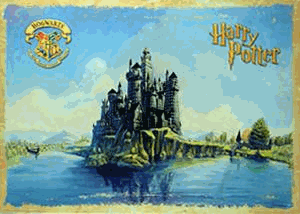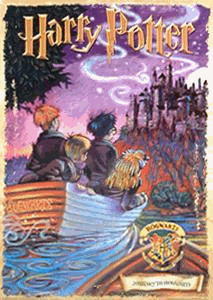Harry Potter: A Theological Analysis
By Adrienne Mitchell and Rolanda Ward (Fall, 2001)
 Ever
since the first book of J.K. Rowling’s Harry Potter series burst onto
bookstore and library shelves worldwide, it has been a source of both
controversy and acclaim. Most among the book’s millions of readers would say
that it is great. Children love the books because of things like their comedy,
the wizard sport "Quidditch," their empowerment of unlikely heroes and
the magical world they presuppose. Meanwhile, parents and educators find the
books valuable because they have gotten so many children reading. However, along
with all of the positive aspects of the Harry Potter phenomena, there is the
backlash created for some by Rowling’s use of fantasy. Many would purport that
Harry Potter promotes witchcraft and by extension Satanism. This has led to many
public protests of Harry Potter, which range from demonstrations trying to ban
the books from school libraries, to the writing of numerous editorials warning
others of Harry Potter’s dangers.
Ever
since the first book of J.K. Rowling’s Harry Potter series burst onto
bookstore and library shelves worldwide, it has been a source of both
controversy and acclaim. Most among the book’s millions of readers would say
that it is great. Children love the books because of things like their comedy,
the wizard sport "Quidditch," their empowerment of unlikely heroes and
the magical world they presuppose. Meanwhile, parents and educators find the
books valuable because they have gotten so many children reading. However, along
with all of the positive aspects of the Harry Potter phenomena, there is the
backlash created for some by Rowling’s use of fantasy. Many would purport that
Harry Potter promotes witchcraft and by extension Satanism. This has led to many
public protests of Harry Potter, which range from demonstrations trying to ban
the books from school libraries, to the writing of numerous editorials warning
others of Harry Potter’s dangers.
Most opponents of Harry Potter start their argument on the basis that the
books are "anti-Christian," "pagan," or even
"satanic" and are vehement in their accusation that the books are
detrimental to children’s fledgling religious sensibilities. An example of
this can be seen in an article that appeared in the January 10, 2000 issue of Christianity
Today. This article tells of nine-year-old Jean-Paul Landreneau, whose
third-grade class was reading Harry Potter and the Sorcerer’s Stone.
His mother, Johanna, was shocked at the idea that her son was being exposed to
such material, stating, "I felt [St. Luke’s Episcopal Day School in Baton
Rouge, Louisiana] shared the same values I did." She believed that Harry
Potter was in fact going against the values she was trying to instill in her son
at home. Jean-Luc says that, "In the bible is says not to do
witchcraft." He thus started to go to the library when Harry was being read
aloud."
The other side of the debate about Harry Potter’s use of fantasy and magic
is equally represented, however. Even in the same issue of Christianity Today
as the article about the Landreneaus, there is another commentary entitled
"Why We Like Harry Potter." In opposition to the Landreneaus, this
article purports that J.K. Rowling "has created a world with real good and
evil, and Harry is definitely on the side of light fighting the "dark
powers." Indeed, it shows that Harry Potter is in several ways
pro-Christian. A similar editorial from The Christian Century would agree
with this viewpoint as well. It speaks of how writer G.K. Chesterton claimed,
"his own journey to Christian faith began with his childhood absorption in
fairy tales." He learned from them "that the world is precious but
puzzling, coherent but mysterious, full of unseen connections and decisive
truths." From this standpoint then, one could defend the point of view that
Harry Potter actually helps children develop their own understanding of
the Christian faith. It is not pagan or satanic, but the book’s overall
message is actually supportive of Christianity. It is such because it opens
children’s minds to the possibility of mystery and its role in faith.
Harry Potter is not the first series of books to be questioned for its use of
fantastic elements. But what is it about Harry Potter specifically that makes
its worldview appear so threatening to some, so meaningful to others? One answer
to this question may lie in the deeper theological issues that the Harry Potter
series addresses. Discussed here will be one such issue—what is
"good" versus "evil" in Harry Potter and the Sorcerer’s
Stone. It is hoped through this presentation’s section on
"good" and the other section on "evil," the reader might
come to rest on the conclusion that the novel is not detrimental to
children, even those of the Christian faith. Some of the book’s views about
these two forces actually reflect what some Christians believe. Hence, the
themes in Harry Potter can actually challenge children positively to think about
what they believe about good and evil.

 To
move through the pages in order, click:
To
move through the pages in order, click:
NEXT
Or go directly to the page you want:
Synopsis of the Harry Potter Stories
Good in Harry Potter as
Defined by Biblical Texts
Evil
in Harry Potter (in the Non-Magical World)
Evil
in Harry Potter (in the Magical World)
Conclusion
 Ever
since the first book of J.K. Rowling’s Harry Potter series burst onto
bookstore and library shelves worldwide, it has been a source of both
controversy and acclaim. Most among the book’s millions of readers would say
that it is great. Children love the books because of things like their comedy,
the wizard sport "Quidditch," their empowerment of unlikely heroes and
the magical world they presuppose. Meanwhile, parents and educators find the
books valuable because they have gotten so many children reading. However, along
with all of the positive aspects of the Harry Potter phenomena, there is the
backlash created for some by Rowling’s use of fantasy. Many would purport that
Harry Potter promotes witchcraft and by extension Satanism. This has led to many
public protests of Harry Potter, which range from demonstrations trying to ban
the books from school libraries, to the writing of numerous editorials warning
others of Harry Potter’s dangers.
Ever
since the first book of J.K. Rowling’s Harry Potter series burst onto
bookstore and library shelves worldwide, it has been a source of both
controversy and acclaim. Most among the book’s millions of readers would say
that it is great. Children love the books because of things like their comedy,
the wizard sport "Quidditch," their empowerment of unlikely heroes and
the magical world they presuppose. Meanwhile, parents and educators find the
books valuable because they have gotten so many children reading. However, along
with all of the positive aspects of the Harry Potter phenomena, there is the
backlash created for some by Rowling’s use of fantasy. Many would purport that
Harry Potter promotes witchcraft and by extension Satanism. This has led to many
public protests of Harry Potter, which range from demonstrations trying to ban
the books from school libraries, to the writing of numerous editorials warning
others of Harry Potter’s dangers. To
move through the pages in order, click:
To
move through the pages in order, click: